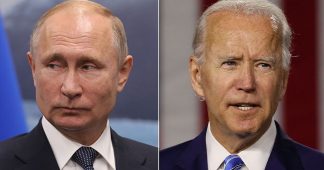Mar 06, 2022
US Republican Senator Lindsey Graham’s recent remarks on Russian President Vladimir Putin indicate some US politicians, especially the far right from the Republican Party, tend to have a kind of latent Nazism and terrorism.
The White House on Friday distanced itself from Graham’s rhetoric on Putin. White House press secretary Jen Psaki said at a press briefing, “That is not the position of the US government and certainly not a statement you’d hear come from the mouth of anybody in this administration.”
In an interview with Fox News on Thursday, Graham said he hopes someone in Russia will understand that Putin is “destroying Russia and you need to take this guy out by any means possible.” Some US media outlets interpreted this as Graham calling for the assassination of Putin.
Graham’s words astonished the world. Graham exploited sensational rhetoric to draw the media attention, in a bid to increase his exposure and reputation among the public. Graham ran in the 2016 presidential campaign.
Li Haidong, a professor from the Institute of International Relations at the China Foreign Affairs University in Beijing, told the Global Times, “The possibility that he wants to run another presidential election can’t be ruled out. He may hope such extreme words toward Russia, as well as Putin, can help him gain more support.”
However, the US Senate is an organ of state power. Generally, the statement of a senator can represent the legislative branch. Against the backdrop in which the political confrontations between the US and Russia are highly intensified, Graham’s fresh line on Putin could easily translate into actual action plans, which will be very dangerous. The US and Russia are both major nuclear powers. Any miscalculation that leads to war would be devastating to the world.
In this context, instead of criticizing or condemning such remarks so as not to mislead the public and the international community, the White House replied too softly. They can argue that American criminals do not represent the US government, either. Would the US government turn a blind eye toward criminals as well?
Furthermore, the US and Russia are not currently at war with each other. And even if they are, a public call for the assassination of the leader of the other side is not justified, either.
“Such a comment from a US politician shows the shoddiness of US diplomatic strategic decisions. Under the leadership of a group of such politicians, the US, as a superpower, will become the biggest troublemaker for global strategic security and stability. The decadence of the US, like the decay of Rome, will bring more instability to the world, and everyone is paying for the folly of American policymakers,” Shen Yi, a professor at the School of International Relations and Public Affairs of Fudan University, told the Global Times.
Since Donald Trump became the US president, some scholars predicted that the US may enter an era of fascism, which can be summarized as unprovoked launching of conflicts or even wars across the world that seem to benefit only the US. Washington’s invasion of Iraq in 2003 is one of such examples. Unfortunately, no country across the world can prevent the US from doing so. The US maintains its power, but it is declining.
“If a country does many unrighteousness practices, no other country will lend it a helping hand when the fire burns it. Washington’s adding fuel to the fire seems to pile a lot of pressure on Russia, but such fire will eventually be drawn against itself. The more the US feels it powerful, the more cautious it should be. The strength it now feels is largely a US fantasy, not a reality. Washington is far from a powerful country as it thinks it is,” Lü Xiang, a research fellow at the Chinese Academy of Social Sciences, told the Global Times.
Published at www.globaltimes.cn
We remind our readers that publication of articles on our site does not mean that we agree with what is written. Our policy is to publish anything which we consider of interest, so as to assist our readers in forming their opinions. Sometimes we even publish articles with which we totally disagree, since we believe it is important for our readers to be informed on as wide a spectrum of views as possible.










